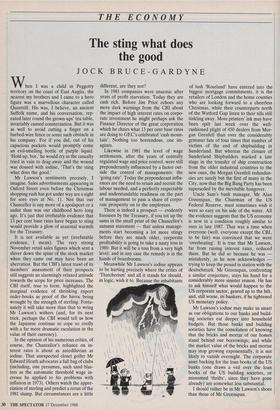THE ECONOMY
The sting what does the good
JOCK BRUCE-GA RDYNE
Mr Lawson's sentiments precisely, I imagine. Sales advertisements appearing in Oxford Street even before the Christmas shopping rush has got under way are a sight for sore eyes at No. 11. Not that our Chancellor is any more of a spoilsport or a sadist than was our childhood hero long ago. It's just that irrefutable evidence that 13 per cent base rates have begun to sting would provide a glow of seasonal warmth for the Treasury.
It is not available as yet (irrefutable evidence, I mean). The very strong November retail sales figures which sent a shiver down the spine of the stock market when they came out may have been an aberration. But the CBI's latest trawl of its members' assessment of their prospects still suggests an alarmingly relaxed attitude towards the scope for price increases. The CBI itself, true to form, highlighted the marginal evidence of shrinking export order-books as proof of the havoc being wrought by the strength of sterling. Fortu- nately it will take more than that to wring Mr Lawson's withers (and, for its next trick, perhaps the CBI would tell us how the Japanese continue to cope so coolly with a far more dramatic escalation in the value of their currency).
In the opinion of his numerous critics, of course, the Chancellor's reliance on in- terest rates is about as antediluvian as iodine. That unexpected closet golfer Mr Edward Heath advocates a full bag of clubs (including, one presumes, such sand blas- ters as the automatic threshold wage in- crease he applied to his problems with inflation in 1973). Others watch the appre- ciation of sterling and predict a rerun of the 1981 slump. But circumstances are a little different, are they not?
In 1981 companies were anaemic after years of profit starvation. Today they are cash rich. Before Jim Prior echoes any more dark warnings from the CBI about the impact of high interest rates on corpo- rate investment he might perhaps ask the Finance Director of the great corporation which he chairs what 13 per cent base rates are doing to GEC's celebrated 'cash moun- tain'. Nothing too horrendous, one im- agines.
Likewise in 1981 the level of wage settlements, after the years of centrally regulated wage and price control, were still preponderantly influenced by a factor out- side the control of managements: the 'going rate'. Today the preponderant influ- ences are the need to retain and recruit the labour needed, and a perfectly respectable and understandable readiness on the part of management to pass a share of corpo- rate prosperity on to the employees.
There is indeed a prospect — evidently foreseen by the Treasury, if you tot up the sums in the small print of the Chancellor's autumn statement — that unless manage- ments start becoming a lot more stingy before they are much older, corporate profitability is going to take a nasty toss in 1989. But it will be a toss from a very high level: and in any case the remedy is in the hands of boardrooms.
Meanwhile Mr Lawson's iodine appears to be hurting precisely where the critics of ‘Thatcherism' and all it stands for should, in logic, wish it to. Because the inhabitants of lush 'Roseland' have entered into the biggest mortgage commitments, it is the retailers of London and the home counties who are looking forward to a cheerless Christmas, while their counterparts north of the Watford Gap listen to their tills still tinkling away. More printers' ink may have been spilt last week over the well- cushioned plight of 450 dealers from Mor- gan Grenfell than over the considerably grimmer fate of four times that number of victims of the end of shipbuilding in Sunderland. But whereas the closure of Sunderland Shipbuilders marked a late stage in the transfer of ship construction from the older industrial countries to the new ones, the Morgan Grenfell redundan- cies are surely but the first of many in the City, now that the Big Bang Party has been superseded by the inevitable hangover.
Uncle Sam's bank manager, Mr Alan Greenspan, the Chairman of the US Federal Reserve, must sometimes wish it were so easy on his side of the water. All the evidence suggests that the US economy is now in a condition roughly similar to ours in late 1987. That was a time when everyone (well, everyone except the CBI, to be fair) was convinced that we were 'overheating'. It is true that Mr Lawson, far from raising interest rates, reduced them. But he did so because he was — mistakenly, as he now acknowledges — trying to keep the pound in station with the deutschmark. Mr Greenspan, confronting a similar conjecture, stays his hand for a considerably more sinister reason. He has to ask himself what would happen to the US corporate sector, geared up to the hilt, and, still worse, its bankers, if he tightened US monetary policy.
Mr Lawson's iodine may make us smart as our obligations to our banks and build- ing societies eat deeper into household budgets. But those banks and building societies have the consolation of knowing that the bricks and mortar of our homes stand behind our borrowings; and while the market value of the bricks and mortar may stop growing exponentially, it is not likely to vanish overnight. The corporate asset backing for the loan books of the US banks (one draws a veil over the loan books of the US building societies, or misnamed 'thrifts', since they have gone already) are somewhat less substantial.
I should rather be in Mr Lawson's shoes than those of Mr Greenspan.


























































 Previous page
Previous page